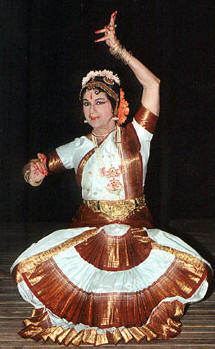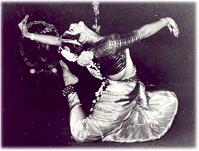Randor Guy in the Hindu, 7 January
2002...
 Cute and charming, "Baby" Kamala
enthralled audiences with her dancing skills from the
tender age of four. She went on to become a leading
Bharathanatyam dancer, lending dignity to the
profession. A profile of the artiste who was honoured
recently.
Cute and charming, "Baby" Kamala
enthralled audiences with her dancing skills from the
tender age of four. She went on to become a leading
Bharathanatyam dancer, lending dignity to the
profession. A profile of the artiste who was honoured
recently.
Bombay City 1938.. A local sabha was conducting its
annual Sree Rama Navami celebrations. One of the events
in the programme was a `kathak' dance by a little girl
� barely four. Cute, charming and
cherubic, she wowed the audience with her stunning
performance. Her name appeared in the programme sheet
as "Baby" Kamala.
Among the audience was A.N. Kalyanasundaram Iyer. A
lawyer-turned-filmmaker, he was then associated with
the sadly neglected pioneer Sarvotham Badhami at Sagar
Movietone and making Tamil pictures for him.
The talented little girl astonished him. He happened to
be involved in the making of a Tamil film "Valibar
Sangam" (1938) at that time. `Baby' Kamala danced in
the film, besides playing a small role. Kalyanasundaram
cast Kamala in his next film "Ramanama Mahimai" (1939)
in a small role and, of course, she danced too. Sadly,
both the films flopped and are barely remembered today.
However, her dances watched by many in studios during
the shooting, caused more than ripples in the Hindi
movie world. She soon danced in many Hindi films of
that period.
Noteworthy among them are two mega hits of the 1940s.
The first was "Kismet" (1943), one of the biggest hits
in the history of Hindi cinema with Ashok Kumar in the
lead. It ran for three long years in the same cinema
hall in Calcutta! Kamala played a role in this
history-making movie, besides dancing.
The other was "Ramrajya"(1943). One of the most famous
and successful mythological movies of Indian cinema, it
was directed by the well-known `mythological master',
Vijay Bhatt(AV. Meiyappan later dubbed "Ramrajya" in
Tamil in 1947.)
 The success of "Kismet" and "Ramrajya"
made Baby Kamala popular in South India and she
attracted the attention of Tamil film producers. So
Kamala and her mother relocated in Madras for the
daughter to get trained in Bharathanatyam, which gained
more respect in 1935 after Rukmini Arundale had her
"arangetram."
The success of "Kismet" and "Ramrajya"
made Baby Kamala popular in South India and she
attracted the attention of Tamil film producers. So
Kamala and her mother relocated in Madras for the
daughter to get trained in Bharathanatyam, which gained
more respect in 1935 after Rukmini Arundale had her
"arangetram."
However, Bharathanatyam had to wait for Baby Kamala to
make it a household word... Kamala underwent training
under the maestro, Kattumannarkoil Muthukumara Pillai.
She later became the disciple of Vazhuvoor B. Ramaiah
Pillai.
The successful Coimbatore-based producer and director
of the Pakshiraja Films, S.M. Sreeramulu Naidu was the
filmmaker who introduced Kamala to Tamil cinema. The
film was "Jagathalaprathapan"(1944).
Being folklore it was a major hit and Kamala performed
the "Snake Dance" in the "Nagalokam" (World of Snakes!)
sequence.
The box office success of the film and her own dance
choreographed by her guru Ramaiah Pillai took her well
on her way to stardom in Tamil cinema. She was barely
ten!
Kamala's film career took a leap ahead when AV.
Meiyappan engaged her for two of his films. One was
"Sri Valli" (1945) directed by the writer-director,
then closely associated with AVM, A.T. Krishnaswamy.
(Meiyappan took joint credit for direction along with
ATK). Kamala interestingly played two roles
� that of "Bala' Valli and "Bala"
Murugan. She performed two classical Bharathanatyam
dances. One was set to the song, "Yaar unnaipol
aatharipavar... Arumughatharssey... " and the other was
:Sinthai arinthuvaadi... Selvakumaran... " Both songs
were sung by P.A. Periyanayaki. The sadly under-rated
classical Carnatic musician, Thuraiyur Rajagopala Sarma
and the AVM in-house composer for many years, R.
Sudharsanam composed the music.
Another memorable film of 1945 for Kamala was the
classic musical "Meera" made by the American Tamil
filmmaker, Ellis R. Dungan, featuring M.S.
Subbulakshmi. Kamala donned the role of Lord Krishna.
She danced along with `Baby' Radha in a dream sequence.
Radha (T. Sadasivam's daughter) was `Bala" Meera.
Kamala also appeared as Krishna in some cut-away shots
in the scene of the immortal melody "Kaatriniley varum
geetham... " sung by MS. The lyrics were composed by
Kalki and Ramaiah Pillai choreographed the dance.
 Kamala also danced
in films like "En magan" (1945), "Ekambavananan"
(1947), "Katagam" (1947) and "Mahatma Udhangar" (1947,
again a snake dance). These movies did not do well and
are mostly forgotten today.
Kamala also danced
in films like "En magan" (1945), "Ekambavananan"
(1947), "Katagam" (1947) and "Mahatma Udhangar" (1947,
again a snake dance). These movies did not do well and
are mostly forgotten today.
Around 1946, a play that was staged in Madras made
waves. Written by journalist Pa. Neelankantan it was
originally titled "Thyaga Ullam" and renamed "Nam
Iruvar" for the stage.
Meiyappan saw the play, was being deeply impressed and
acquired the movie rights. He made changes in the play
for his film shot at his own studio in Karaikudi.
He was eager to include the patriotic songs of
Subramania Bharathiar.
Kamala played the sister of the hero and danced to the
songs "Aaduvomey pallu paaduvomey... ananda
sudhanthiram... " and Vettri ettu dikkumena
kottumurasey... !" D.K. Pattammal sang these famous
Bharathiar songs off-screen. Kamala's dances not only
proved to be the highlights of the film but also
created film and cultural history.
Kamala also had two songs and dance items with lyrics
written about Mahatma Gandhi "Karuna murthy Gandhi
Mahatma... !" and "Mahan... Gandhi... Mahan!" The songs
were rendered off screen by the `baby-voiced' playback
singer M.R. Rajeswari.
"Nam Iruvar" (1947) was a thumping success and Kamala's
dance ushered in a cultural revolution in the
Tamil-speaking areas of the old Madras Presidency.
Dance schools sprouted all over and Bharathanatyam
acquired respectability.
Later, Kamala danced in several (some numbers she
composed herself) Tamil, Hindi, Kannada and Telugu
movies. Besides she played major roles in Tamil movies
like "Lavanya," "Konjum Salangai" and "Sivaganga
Seemai" and in Hindi films like "Jwala."
She won worldwide laurels and soon became an icon in
Bharathanatyam. This year, during the Margazhi
festival, Kamala was honoured by the Music Academy with
the Platinum Jubilee award.